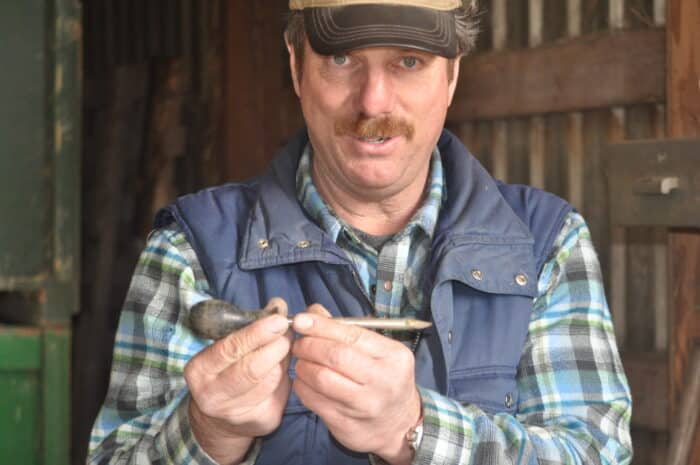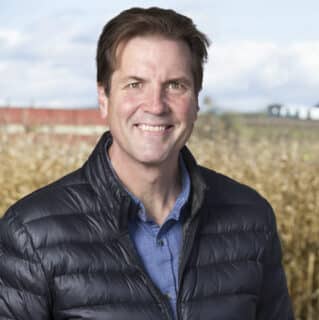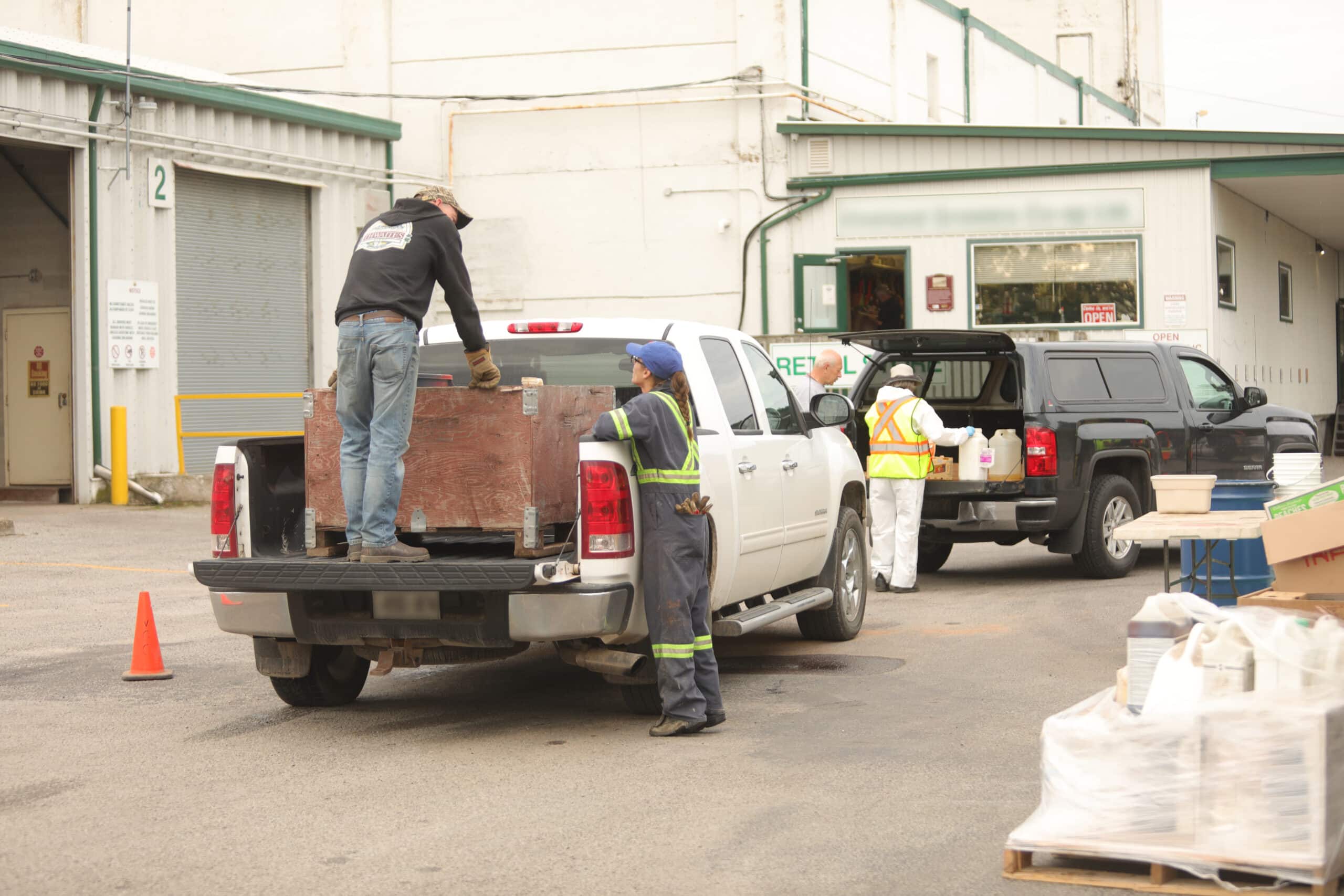For disposing of agriculture chemicals safely, social license to operate is just the start.
One of British Columbia’s largest-acre and best-known seed potato farmers, Bill Zylmans, has a whole list of management ease and environmental reasons he’s a big proponent of safe disposal for ag chemicals. What’s his top reason? He’s got a story ready and waiting to explain.
“When I was a kid, I don’t even know what my father or others did with their excess chemicals. Maybe they went to the back 40 and just dumped them to be done with it. As we’ve become more environmentally conscious, especially in places like where we farm which is so integrated with the general public, how you manage your chemicals matters a lot.”
While much of B.C.’s prime agricultural land coexists with urban development, Zylmans farms is some of the mostly densely populated farmland in the entire province: Delta, just a stone’s throw from Vancouver. He adjusts his operations to align with urban, mostly ag-unaware neighbours, including spraying exclusively between 10 p.m. and 2 a.m. to minimize friction. About eight years ago, a middle-of-the-night spray was followed by a bright and early visit from the B.C. Ministry of Environment.
“They arrived asking to see my spray records,” he starts the story.
No problem, he said, pulling out all the correct documentation, then touring them past his well-kept chemical shed and sprayer. He wasn’t surprised when they finally explained why they’d come.
“They said, ‘We’re here because there were complaints at city hall this morning. A bunch of people who live near here reported someone out with a sprayer last night, spraying ‘bad stuff’. They all say they’re sick this morning’.”

Zylmans says the unfounded accusation was infuriating. “I wanted to say: where’s the [Farm Practices Protection (Right to Farm) Act],” he says. Instead, he concocted a more satisfying plan.
“I said to the environment guys: ‘I don’t like people pointing fingers at farmers. I’m going to go back out and spray tonight, but earlier than I usually go so people are still awake. I’m not going to quiet like I usually am — we’re going to have the beacons going on my tractor and flashing lights. We’re going to create an entourage. I’m going to give up two hours of my time, and you’re going to send someone to monitor that what I fill into my tank is just water. If you get complaints tomorrow, we’re going to have another conversation because then you’ll know how bogus this is.’”
So away he went at 9 p.m. that night, lights flashing, sprayer pumping out a very visible spray of pure water. Every farmer who’s had a run-in with non-farming neighbours can guess exactly what happened next:
“At 8:35 a.m. the next morning, city hall’s switchboard lit up like a Christmas tree,” he says. “According to the callers, they were all sick. That’s what we have to deal with. That’s why being able to prove that you’re doing everything right matters so much.”
Maintaining social license to operate — essentially, being seen by the public as doing the ‘right’ things for society and the environment — is becoming a more and more critical aspect of modern farming. At both the individual farm and the industry level, farmers need to be able to prove they’re managing resources and inputs in a manner acceptable to society. Zylmans says his night-spraying example is exactly why strategic cooperation between various levels of government, farmers, chemical suppliers, and associated service providers is so important. It’s also why, as chair of both the B.C. Seed Potato Growers Association and the Canadian Potato Council, he actively promotes producer uptake of safe ag chemical disposal and other environmentally and socially conscious initiatives.
Cleanfarms is Canada’s ag recycler. Operating in every province, Cleanfarms is a non-profit environmental stewardship organization that strives to keep recyclable materials — especially plastics — out of landfills and burn piles, Cleanfarms’ Executive Director Barry Friesen explains. Cleanfarms currently operates multiple permanent ag recycling programs across the country. Its primary programs include recycling small plastic pesticide and fertilizer containers up to 23 litres and plastic totes and drums up to 1,000 litres. To expand the range of ag plastics that can be recycled, Cleanfarms also conducts pilot programs to collect and manage baler twine, seed, pesticide and inoculant bags, and bale wrap and silage plastic in various jurisdictions. In Saskatchewan, Manitoba, and soon Prince Edward Island, it also operates programs to collect and recycle used grain bags.
Cleanfarms’ other service is collecting and safely disposing of unwanted hazardous ag chemicals and livestock and equine medications.
There are all kinds of reasons small — and sometimes large — quantities of ag chemicals might end up unused and unwanted. Deregistered and outdated products make up most of the chemicals requiring disposal, but changing farm plans contribute a share as well. Very frequently, larger quantities of product are delivered to Cleanfarms collection events for disposal when farms change hands.
“A lot of what we get is 30, 40, 50 years old. Often, it’s not until there’s a new owner of a farm who opens up an old chem shed and finds all kinds of stuff that needs safe disposal,” Friesen says. “We offer a really important service, particularly for that very old and at times dangerous stuff.”
Last year, Cleanfarms collected 323,000 kgs of chemical for disposal, most of which was liquid product. In addition, they collected 10,000 kg of livestock and equine medication.
“Some farmers might come in with a litre or less in a container and that’s all they’ve got. Others come in with pickup trucks loaded with very old material for us to take off their hands,” says Friesen.

The ag chem disposal program run by Cleanfarms was initiated by CropLife Canada in 1998 and taken over by Cleanfarms in 2010. In its 25 years of existence, the program has collected and safely disposed of a whopping 4.2 million kilograms of ag chemicals and livestock medications.
It’s nearly impossible to estimate how much unused, unwanted ag chemical still sits in farmers’ chem sheds. What Friesen does know is the donated chemicals are getting newer over time. Whereas well over 50 per cent of the delivered materials were very old when the program began in 1998; today old materials account for less than 25 per cent of product delivered. That’s a good thing, as it means there’s less hazardous, old, and unused material sitting undelivered. That said, ag chem disposal has inroads still to make with some farmers.
“Fifty per cent of all participants in the program are still first-time users,” says Friesen. “It’s not that they don’t know about us, they usually do. It’s that they don’t generally want to drive in for one liter in a jug. They usually wait ‘til they have 10 of those containers.”
Cleanfarms’ entire goal is to support agriculture’s environmental responsibility. It knows collecting ag plastic products for recycling and ag chemicals for disposal depends on farmer buy-in.
“We’re not an enviro-cop or a regulator. What we do is offer solutions,” says Friesen.
Zylmans appreciates that solution-based mentality.
“They’ll take what you bring them, which really eases the mind for a farmer. You’re not going to get penalized if you bring a container of DDT. There won’t be 99 questions about: ‘Where did you get this?’, ‘How long have you had it?’ It’s just drop it off, ‘Thank you for delivering. Have a good day.’”
Cleanfarms coordinates ‘blitz-style’ chemical drop-off days, usually in the fall, at various locations in every province on a cyclical basis. Cleanfarms hires hazardous waste contractors to safely manage the material and to dispose of it using high temperature incineration.
Who ultimately pays the $1 to $2 million annual price tag for Cleanfarms’ safe chemical disposal program and, more broadly, its recycling programs too? Certain pilot programs are sometimes covered by government, including a recycling pilot for grain bags and twine in Alberta. Permanent programs, however, including safe disposal programs, are paid for by ag companies and associations which are members of Cleanfarms. In some cases, a non-refundable Environmental Handling Fee (EHF) is added to the initial cost of the product or added as a fee at retail.
“The reality is that farmers are paying for recycling and safe disposal, even if sometimes they don’t know it,” adds Friesen. “They might as well enjoy the benefits of the programs.”
Header photo — Agricultural plastics are collected by Cleanfarms. Photo: Cleanfarms
Related Articles
CleanFarms Announces Fall 2023 Collection Events









